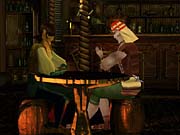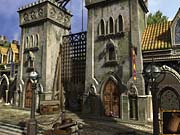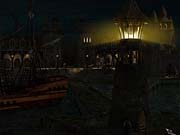In the early days of PC gaming, adventure games were one of the premier genres because they excelled at one of the greatest things a game can do: immersing players in a fantastic world. Since then, other genres like role-playing games and action games have evolved to provide more engaging experiences than ever before, but adventure games haven't changed much. Moving to a new game area often just requires a mouse click or finding the right inventory item to solve a puzzle, and puzzle-solving lies at the heart of the gameplay. Since the mechanics themselves tend to be very simple, any good adventure game these days had better feature an unforgettable setting and story, along with challenging but not frustrating puzzles, in order to compete against more sophisticated games, let alone to rise above the mediocre standards for adventure gaming. Jazz and Faust, the first US publishing effort by Russian company 1C, doesn't manage any of this. This traditional adventure game offers a few attractive scenes, but otherwise it's an exercise in tedium that will disappoint even avid adventure gamers.

Jazz and Faust lets you explore multiple lands recalling Europe during the age of sail and the Middle East of the Arabian Nights using either of the eponymous main characters. The gameworld of Jazz and Faust is presented as a series of still images, as in Myst. You get lots of pretty pictures, but you can view each largely static scene from only one fixed angle. Unlike in Myst, you do get to control an onscreen character, making him move about by clicking with the mouse. Unfortunately, the game's third-person view seems unnecessary and needlessly slows the gameplay, forcing you to watch Jazz or Faust trudge across the screen to leave for another area. No one expects or wants high-adrenaline thrills from an adventure game, but why make things slower than they need to be?
At least the game's interface is clear and intuitive. You interact with people and objects by simply hovering the mouse cursor over them and clicking. The context-sensitive cursor icon changes shape to let you know what you can do in each case, turning into a flashlight, for example, when you can examine an item in greater detail. If you then click the item in question, Jazz or Faust will utter a line or two about it. (The game is subtitled, too.) A hand icon means you can pick up an item, a compass icon means you can travel offscreen to a new area, and so forth. Inventory management is equally simple: Just right-click to view your items, clicking two arrows to scroll through them.
But offering a straightforward interface isn't much to brag about because any half-decent adventure game will offer that. There's not much to screw up, really. It's the sights and sounds, the story, and the puzzles that make or break adventure games. As for Jazz and Faust's setting, you get a mishmash fantasy world with locales reminiscent of a 17th-century Mediterranean port, a South Seas island, and medieval Persia. None of this is put together well or richly imagined--the game lacks a coherent and memorable world that you'd really want to explore. Jazz and Faust simply can't compete with the alien and unforgettable locales of last year's Myst III or the evocative scenes in the little-known but entertaining Road to India.
Jazz and Faust's lame, forgettable story fares no better, centering on a murder mystery and a buried treasure, though the game's manual inexplicably explains the mystery before you even play the game. You can play from the perspective of either Jazz or Faust, getting different challenges with each character, though the locales and weak ending are the same either way.

An almost total lack of characterization doesn't help the game, either. None of the characters, including Jazz and Faust themselves, seem real or warrant your sympathy or interest. The game's dialogue is clumsy and boring, mainly just consisting of simple instructions about what puzzle you need to solve next. Making matters worse, when you click on an object to hear it described in greater detail, Jazz or Faust will offer up painfully obvious and unimportant observations like, "Miranda's pots and pans are always beautifully clean" or "These bright flags cheer up the monotonous landscape." Who cares? Evincing stunning insight, Jazz tells us how his grandfather broke his leg and then notes, "It hurt a lot." Sometimes you'll at least get a laugh when Jazz or Faust utters a bizarre and confounding non sequitur like "Do I look like a man who pees in his pants?"

"It's too soon for me to go there," Jazz bluntly tells you early in the game as he tries to enter a cemetery but is barred from proceeding. By "too early," he's apparently referring to the time of day, but that line could just as easily refer to the game's approach to puzzles as a whole. Much of the time, you'll see an object or area, yet for some reason, you simply can't pick it up or move to it because it's "too soon" to do so. You'll have the keys to a prison door, yet they mysteriously won't open the door until you liberate a fellow prisoner. There's no logic to it at all. This means you'll have to try the same thing multiple times throughout the game, hoping you've triggered some invisible switch that lets you suddenly achieve what you couldn't before. Also, there's only one way to solve each dilemma, meaning creative thinking is mostly irrelevant here. It all seems utterly forced and arbitrary and makes Jazz and Faust one of the least subtle adventure games in a while. On top of that, the game falls prey to the old adventure game malady of pixel hunting--forcing you to look for small, easily overlooked items partially hidden in the dark or near the edge of the screen.
The game's challenges tend to revolve around a painfully linear series of "go fetch this" puzzles. You'll spend most of your time seeking out items for different characters in order to gain more items or information. Other than that, you'll engage in very simplistic environmental manipulation or the occasional spatial challenge, like a jigsaw puzzle made of tombstone fragments. The fact that the puzzles are generally simple--the game often beats you over the head with clues, practically telling you what to do--and at the same time tedious to solve, thanks to the back-and-forth trudging of the 3D main characters, really hurts the game.
Visually at least, Jazz and Faust can be rather pleasant, thanks to its attractive hand-painted settings. For a welcome bit of variety, you'll get to enjoy some of the settings during the day and then at night. Still the game's scenes are for the most part about as lively as a corpse. They're generally static images largely uninhabited by other characters or movement. Fortunately, there are a few dynamic visual touches that liven things up slightly, like moths swarming around a lantern at night or smoke billowing lazily from a village chimney. Characters, such as Jazz, Faust, and the nonplayer characters you meet in the game, move around slightly, but they're represented by some truly ugly character models, and poorly animated ones at that.
While Jazz and Faust's visuals are simply mediocre, the game's audio is in need of major help. In the port of Er-Elp, where the game begins, you'll encounter a motley and improbable cast of characters with accents--often fake-sounding ones--seemingly picked at random: Chinese, Scottish, Cockney, American backwoods hick, you name it. Ports do draw travelers from distant lands, but there's little rhyme or reason to be found in this particular mishmash of nationalities. It gets worse later when a Janissary-style guard in the game's Persian-like setting talks to you in a lower-class English accent.

On top of that, most of the actors read their lines with precious little conviction or believability. For instance, the actor who plays Jazz speaks most of his lines in a phenomenally bored and boring monotone. You can easily imagine the actor at the recording sessions fidgeting and checking his watch, anxious to get it over with and get out of there.
Jazz and Faust's sound effects are sparse and not particularly effective. The music, which is monotonous to the point of being downright annoying, sometimes sounds like a parody of New Age icon Kitaro on a really bad day or perhaps some forgotten early-'80s synth band. Not only is the music bad in its own right, but it's often as stylistically suited to the game's quasi-historical setting as gangster rap would be if it were performed at a coronation.
The past few years have offered us a few really good adventure games like The Longest Journey and Myst III. PC adventure games are few and far between, and considering its dull, clumsy gameplay and bad writing, Jazz and Faust is a depressing reminder of why so many gamers have left adventure games behind.